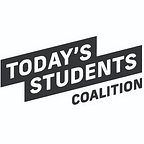Higher Ed’s Two-Fold Problem with Mental Health Care
by Juan R. Pantoja-Patiño, M.S.
As a counselor at a university counseling center, I am honored to walk alongside students’ journeys to healing and change. But in reality, college and university counselors are currently balancing high volumes of caseloads, which are often intense in nature. This comes at a cost to both the student — and the counselor. It takes emotional investment to treat and support students in psychological distress quickly enough to keep them on track in school. One of the often overlooked problems with higher ed’s mental health crisis is how these high-stress environments also impact counselors. We can protect the mental health of students and counselors by directing additional funds and resources to our institutions of higher education. This includes additional funding to the Garrett Lee Smith Campus (GLS) Suicide Prevent Grant, the only federal program currently available to support mental health services for college students.
In my work setting, we have a student population of about 13,000 and 17 full-time counselors with an average of 15+ hours a week dedicated to counseling, including crisis services. Although 15+ hours of clinical work a week may not seem like a lot, it is not so much the number of students (1 hour = 1 student) we work with but the intensity of students’ concerns. For example, in a typical week, I meet with students struggling with chronic suicidal thoughts, managing the aftermath of a sexual assault, or processing the death of their parents. Many folks not in the mental health profession, including elected officials, are unaware of the struggle both students and college/university counselors face.
According to Penn State University’s Center for Collegiate Mental Health (CCMH), the demand for counseling services at colleges and universities in the U.S. has grown at alarming rates since 2009, outpacing counseling centers’ capacity to meet the needs of students. Unfortunately, that rising demand hasn’t been matched by a rise in funding, which has led mental health professionals (e.g., counselors, social workers, psychologists) to juggle higher caseloads. The average annual caseload for a full-time college/university counselor is about 120 students, with some centers averaging more than 300 students per counselor.
The reasons for such an increase in demand include both negative and positive. On the bright side, today’s students are more willing to seek counseling services as the stigma around mental health care improves. On the other hand, more students have been exposed to multiple stressors beyond normative college stressors, such as social injustice, mass violence, economic strain, and the COVID-19 pandemic. Many college students who sought counseling in 2022 frequently reported a history of trauma that surpassed prior mental health trends related to trauma in the past ten years. This trend is alarming, as it highlights the growing college mental health care crisis.
Having timely access to counseling services is critical for students’ success and ability to persist in college, graduate, and contribute to the U.S. economy. This is particularly true when we can clearly see an increased demand for counseling services. Without access to mental health resources, students are more likely to experience thoughts of suicide, self-harm, hopelessness, depression, etc., all of which increase the chances of students failing their classes or even dropping out of college. Presently, the university counseling center where work has a growing waitlist of students looking to get connected to a counselor. Sadly, I have witnessed students walk to the counseling center in significant distress — in some cases, they have been waiting for weeks and can no longer wait for assistance. These students often present with a high risk for suicide or self-harm, which may require them to be hospitalized.
There is a dire need for Congress to invest more in existing programs and reexamine ways that key legislation can support the needs of college students and the rising demand for counseling support. If there aren’t efforts to increase funding to the Garrett Lee Smith Campus (GLS) Suicide Prevent Grant, students, and counselors risk falling victim to the effects of the college mental health care crisis.
Juan R. Pantoja-Patiño is a former TSC Student Ambassador Fellow and a Ph.D. candidate in counseling psychology at Loyola University Chicago.
